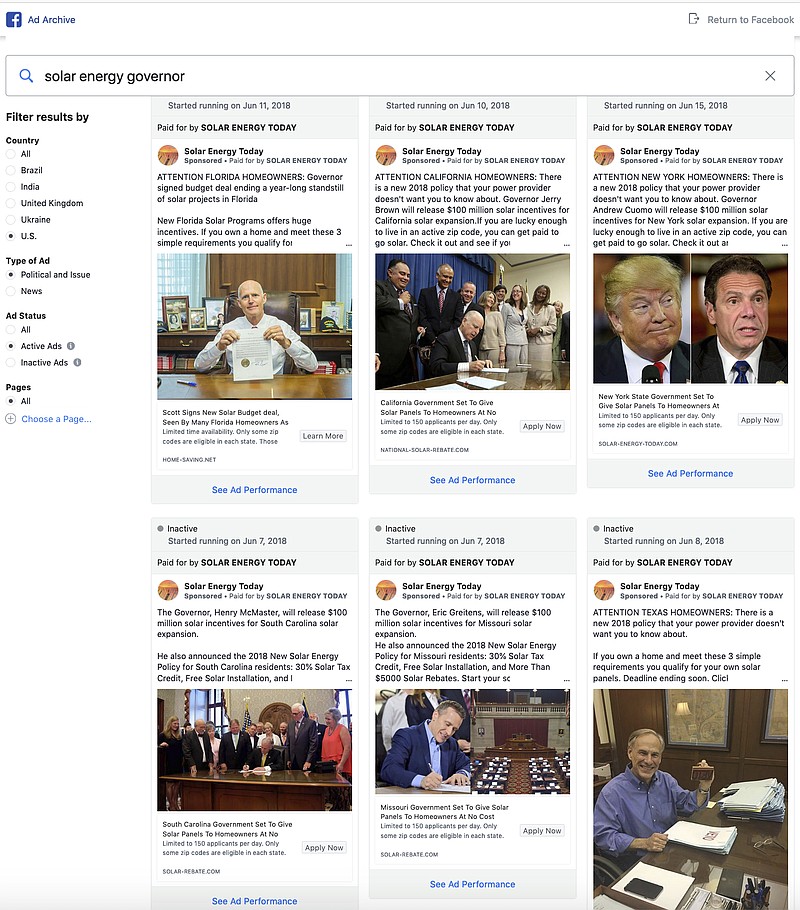Hundreds of ads on Facebook promised U.S. homeowners they were eligible for huge state tax breaks if they installed new solar-energy panels. There was just one catch: None of it was true.
The scam ads used photos of nearly every U.S. governor - and sometimes President Donald Trump - to claim that with new, lucrative tax incentives, people might actually make money by installing solar technology on their homes. Facebook users only needed to enter their addresses, email, utility information and phone number to find out more.
Those incentives don't exist.
While the ads didn't aim to bilk people of money directly - and it wasn't possible to buy solar panels through these ads - they led to websites that harvested personal information that could be used to expose respondents to future come-ons, both scammy and legitimate. It's not clear that the data was actually used in such a manner.
Facebook apparently didn't take action until notified by state-government officials who noticed the ads.
The fictitious notices reveal how easily scammers can pelt internet users with misinformation for months, undetected. They also raise further questions about whether big tech companies such as Facebook are capable of policing misleading ads, especially as the 2020 elections - and the prospect of another onslaught of online misinformation - loom.
"This is definitely concerning - definitely, it's misinformation," said Young Mie Kim, a University of Wisconsin-Madison professor who studied 5 million Facebook ads during the 2016 elections. "I keep telling people: We don't have any basis to regulate such a thing."
Experts said websites and apps need to be more transparent about the ads that run on their platforms.
Last year, Facebook launched a searchable database that provides details on political ads it runs, including who bought them and the age and gender of the audience. However, it doesn't make that information available for other ads. Twitter offers its own database of ads and promoted tweets. Google has an archive for political ads only.
The partial approaches allow misleading ads to fester. One problem is the fact ads can be targeted so narrowly that journalists and watchdog groups often won't see them.
"That allows people to do more dirty tricks," said Ian Vanderwalker, senior counsel at the Brennan Center for Justice's Democracy Program.
In mid-March, some websites linked in the fake solar-energy ads disappeared. After complaints from governors' offices, Facebook inactivated nearly all of the ads and several pages affiliated with them.
"These scammy ads have no place on Facebook," company spokeswoman Devon Kearns said in a statement. "We removed these pages and disabled these ad accounts recently and will continue to take action."
Facebook said it uses an automated process to review the images, text, targeting and position of ads posted to its site. In some cases, employees review the ads. Users can also give feedback if they believe the ads violate company policies.
Governors' offices were alarmed to see photos of top politicians featured alongside claims such as "you can get paid to go solar."
Helen Kalla, a spokeswoman for Nevada Gov. Steve Sisolak, said she notified Facebook last month after staffers saw them.
Facebook took them down days later, although some continued to re-appear days after that complaint. Facebook also yanked ads featuring images of governors in Texas, Illinois, Colorado, Arizona, South Carolina and other states. However, the ads had already been running for some time.
After researching solar-panel options for his two-story home in Mount Tabor, New Jersey, 37-year-old Chris Fitzpatrick saw an ad claiming he might qualify for "free" solar panels because Gov. Phil Murphy planned to release "$100 million solar incentives." He was skeptical because none of the solar companies he worked with mentioned such incentives, but worried others might not be.
"It's very frustrating because it preys upon innocent people," Fitzpatrick said.

